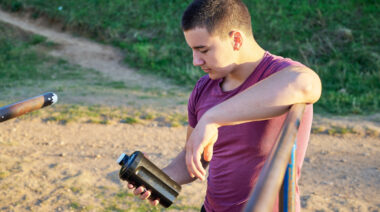As a stimulant, many people consume caffeine every day as a part of their wake up routine. It’s been a part of the human diet for a very, very long time. Since it comes in so many delicious forms, it makes sense, too, but how about its use as a performance enhancer?
Believe it or not, there has been a lot of research into the use of caffeine as more than just something to get you going in the morning. People have been curious for a while now about whether or not it actually can help make you a better athlete. Studies have been mixed about caffeine, though. In particular, most studies have focused on its use as an ergogenic aid, meaning it boosts your performance. Some show a very clear benefit in this regard and some show none.
To add fuel to the fire, a study in the Journal of Strength and Conditioning reviewed the effects of caffeine on basketball players. They tested numerous possible benefits, including cardio factors like V02 max, blood lactate, etc., and also vertical leap. In addition they measured perceived exertion – the athletes’ feelings about how hard they were working. Each athlete was tested twice, in random order. For one of the tests they took 3 mgs of caffeine per kilo of body weight, and the other time they took nothing at all.
Now 3 mgs per kilo of body weight is a good strong dose of caffeine. At 180 lbs that would be nearly 3 cups of coffee. Enough caffeine that you’d probably be feeling the effects, depending on your tolerance and body weight.
Interestingly, in this particular study, there was no significant difference in any of the measured factors, no matter which order the trial occurred in – whether caffeine was used for the first test or the second.
It’s hard to say what to make of this exactly. I’ve seen thorough studies that have clearly demonstrated caffeine’s benefits in athletics. It would be important to see the frequency and dosage of caffeine use per athlete before they begin a study like this, as caffeine tends to have stunted effects over time. It would also be useful to know if it assists more in longer term activities, like a full basketball game. It may be that caffeine’s primary benefit is in the mobilization of fat as a fuel source, and in these particular tests that didn’t really show through. In particular the effects might not have been demonstrated because of the small sample size. This study used only five athletes.
One thing is for sure, I’ll keep drinking caffeine. In my own anecdotal experience, it does seem to have an effect on my runs, both in actual performance and in perceived exertion, especially if I don’t abuse it as many people do. Keep your consumption down to pre-work out and try for yourself to see if it works for you.
References:
1. Matthew Tucker, et. al., “The Effect of Caffeine on Maximal Oxygen Uptake and Vertical Jump Performance in Male Basketball Players,” Journal of Strength & Conditioning Research, 27:2 (2013)
Photo courtesy of Shutterstock.






